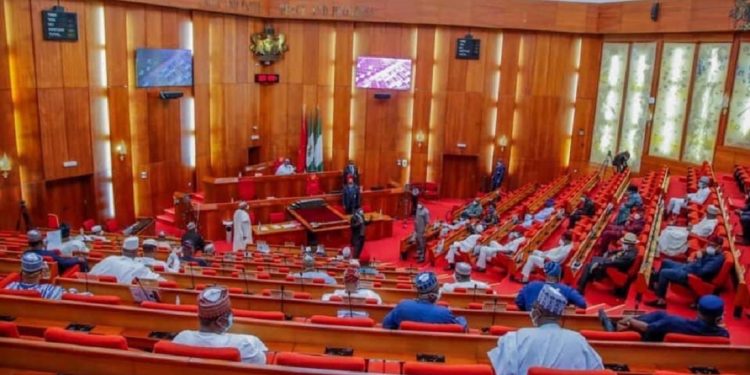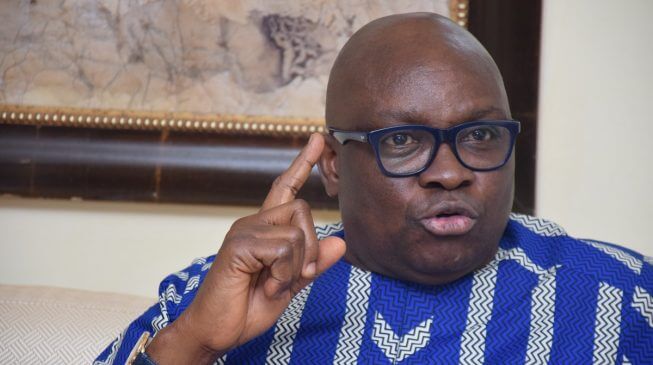The Senate resolved that the Independent National Electoral Commission (INEC) is free to determine the mode of transmission of results during elections, including electronic transmission or manual transmission.
This represents reversal of its earlier resolution that INEC can transmit elections results electronically with approval from NCC and the National Assembly.
The resolutions of the Upper Chamber followed a motion titled: “Motion for recommittal” sponsored by the Senate Leader Yahaya Abdullahi (Kebbi North).
This came barely three months after it adopted a resolution rejecting electronic transmission of results in the Electoral Act 2010 (Repeal and Re-enactment) Bill, 2021, the Senate, on Tuesday, reversed itself.
The upper legislative chamber in a motion for re-committal, re-amended certain aspects of the bill contained in clauses 43, 52, 63 and 87, respectively.
REPORTERS AT LARGE checks revealed that in the amendment to Clause 52(3), the lawmakers gave a proviso that the national telecommunication regulatory agency, the Nigeria Communications Commission, (NCC) should determine when electronic transmission be deployed, subject to the approval of the National Assembly.
The Senate last July approved that “the Commission (INEC) may consider the electronic transmission of results, provided the national coverage is adjudged to be adequate and secure by the National Communications Commission and approved by the National Assembly.”
But at plenary on Tuesday, the Senate amended the Clause to give the Independent National Electoral Commission the discretion to decide on electronic voting.
The new “Clause 52 (2): Conduct of poll by open secret ballot reads that: ” Subject to section 63 of this Bill, voting at an election and transmission of results under this Bill shall be in accordance with the procedure determined by the Commission, which may include electronic voting.”
The Red Chamber also amended its earlier clause where it gave political parties the option of direct and indirect primaries as a mode of selecting candidates for general elections.
The amendment jettisoned indirect primary as it restricted political parties to only direct primary.
The amended Clause 87 on Nomination of candidates by parties now Clause 87. (1) reads: “A political party seeking to nominate candidates for elections under this Bill shall hold direct primaries for aspirants to all elective positions, which shall be monitored by the Commission.”
REPORTERS AT LARGE Online gathered that its counterpart in the House of Representatives had earlier approved the resolution on electronic transmission of results without a proviso and equally adopted the direct primary as a method for the emergence of candidates for general elections.
The Conference Committee set up by both chambers is expected to harmonise resolutions of both chambers of Parliament.
The adoption of the direct primary however generated different reactions from the lawmakers.
Former Kebbi State governor and senator representing Kebbi Central, Adamu Aliero who seconded the motion for the amendment said it was a move in the right direction as he noted that it would help ‘to enthrone real democracy and make the electorate to reject people of unconscionable character and stop moneybags from hijacking the process.
“We should not allow people with questionable character to take over the political process.”
Senator representing Ekiti Central, Michael Opeyemi Bamidele aligned with the submission as he said the direct primary would ensure that every card-carrying member has a sense of belonging.
“It is a way of giving power back to the people. Every Party will enjoy this right. ‘For our democracy to grow, it is time to adopt a direct mode of primary in line with global best practices.”
Senator representing Oyo North, Abdulfatai Buhari also said it was the most effective option.
“If we say we are practising democracy and we are copying the developed world, let us do it the way it is done. It will give a sense of belonging to the party members if we stick to direct primary.”
Senator representing Kogi State, Smart Adeyemi however asked the Senate to stick to its earlier resolution for direct and indirect primaries.
He further argued that the indirect primary was more cost-effective and less cumbersome.
Senate Minority Leader, Enyinnaya Abaribe cautioned against the imposition of options on political parties.
“On the mode of primary, the original situation is that parties are left to determine which method suits them. Not all parties have the capacity to organise direct. Parties that don’t have the capacity should be allowed to do indirect primary. With this view, I rest my case.”








